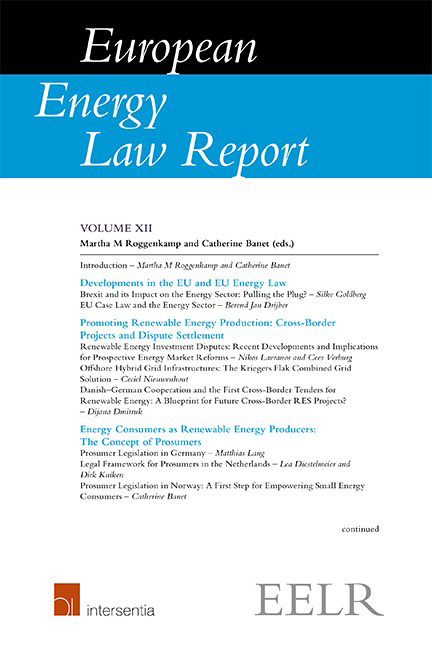Book contents
- Frontmatter
- Preface
- Contents
- List of Abbreviations
- List of Contributors
- Introduction
- PART I Developments In The EU and EU Energy Law
- Chapter I Brexit and its Impact on the Energy Sector: Pulling the Plug?
- Chapter II EU Case Law and the Energy Sector
- PART II Promoting Renewable Energy Production: Cross-Border Projects And Dispute Settlement
- PART III Energy Consumers As Renewable Energy Producers: The Concept Of Prosumers
- PART IV Balancing Renewable Electricity Production Withsupply Security: National Experiences With Capacity Mechanisms
- PART V Promoting The Use Of Sustainable Gas And Security Of Gas Supply
Chapter II - EU Case Law and the Energy Sector
from PART I - Developments In The EU and EU Energy Law
Published online by Cambridge University Press: 31 January 2019
- Frontmatter
- Preface
- Contents
- List of Abbreviations
- List of Contributors
- Introduction
- PART I Developments In The EU and EU Energy Law
- Chapter I Brexit and its Impact on the Energy Sector: Pulling the Plug?
- Chapter II EU Case Law and the Energy Sector
- PART II Promoting Renewable Energy Production: Cross-Border Projects And Dispute Settlement
- PART III Energy Consumers As Renewable Energy Producers: The Concept Of Prosumers
- PART IV Balancing Renewable Electricity Production Withsupply Security: National Experiences With Capacity Mechanisms
- PART V Promoting The Use Of Sustainable Gas And Security Of Gas Supply
Summary
INTRODUCTION
This contribution reviews the case law of the Luxembourg-based European Court of Justice (ECJ or the Court) regarding the energy sector from mid-2016 to the turn of 2017/18. Most decisions are preliminary rulings at the request of a national court of one of the EU Member States (Article 267 of the Treaty on the Functioning of the European Union (TFEU)). The ECJ also hears cases brought by the European Commission (the Commission) against one or more Member States (Article 258 TFEU), as well as appeals against rulings of the General Court on points of law (Article 263 TFEU). The General Court hears at first instance the administrative law appeals against decisions of EU institutions and EU agencies.
The chapter is organised as follows. It starts by discussing cases concerning certain internal market rules (section 2). It goes on to look at two cases involving a dispute on capacity allocation (section 3). The next topic is a series of cases regarding free CO 2 emission allowances (section 4). Subsequently, the chapter discusses cases relating to renewables that reflect the energy transition from fossil sources to renewable energy (section 5). Finally, it deals with disputes involving the rules on State aid, which is an area of growing importance for the energy sector (section 6).
INTERNAL MARKET
ANODE
In a liberalised market, prices are set by the free play of supply and demand in the market. For social reasons a Member State may wish to protect certain categories of end users, such as households, against increases in energy prices.
This French case concerns the regulation of prices for the supply of natural gas to consumers in order to protect security of supply and territorial cohesion. Energy suppliers have a statutory obligation to apply tariffs calculated in accordance with cost-based criteria drawn up by public authorities. ANODE, an association of suppliers operating at retail level, challenged the compatibility of this tariff regulation with the public service provisions in Article 3 of the Directive 2009/73, the Third Gas Directive and the general provision on services of general economic interest laid down in Article 106(2) TFEU. In essence, ANODE argued that these rules do not provide a proper justification for rules restricting the free play of market forces.
- Type
- Chapter
- Information
- European Energy Law Report XII , pp. 43 - 62Publisher: IntersentiaPrint publication year: 2018

